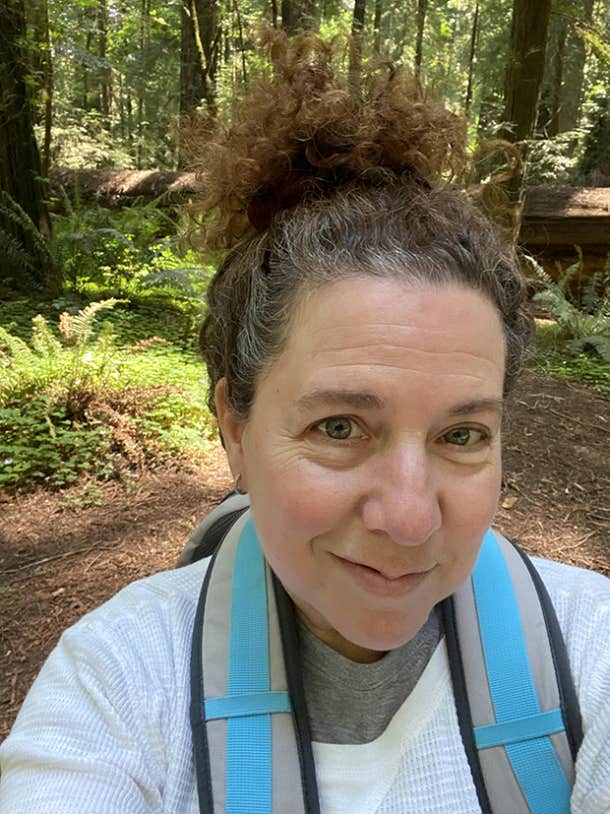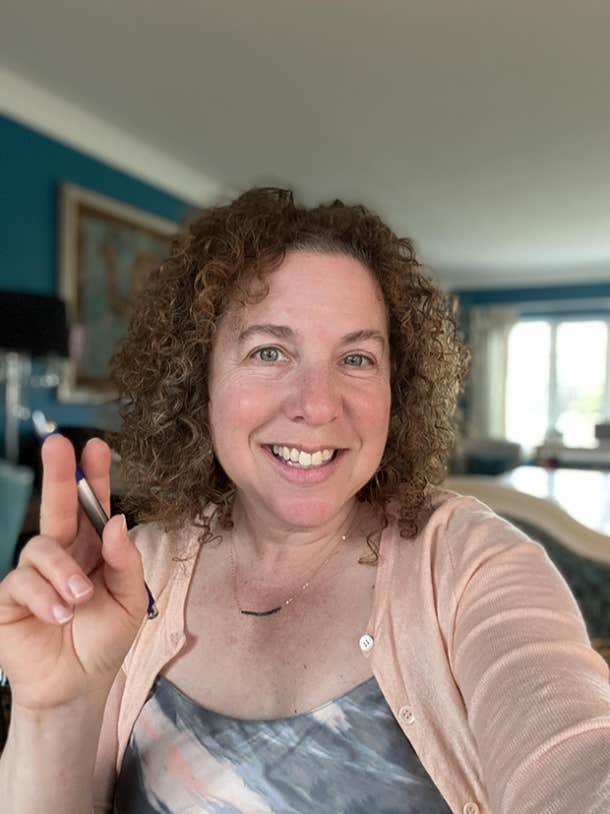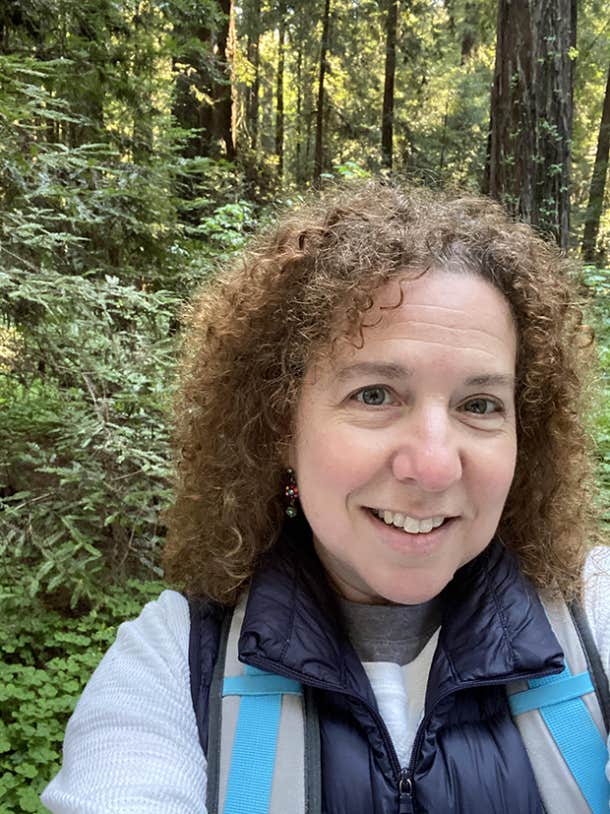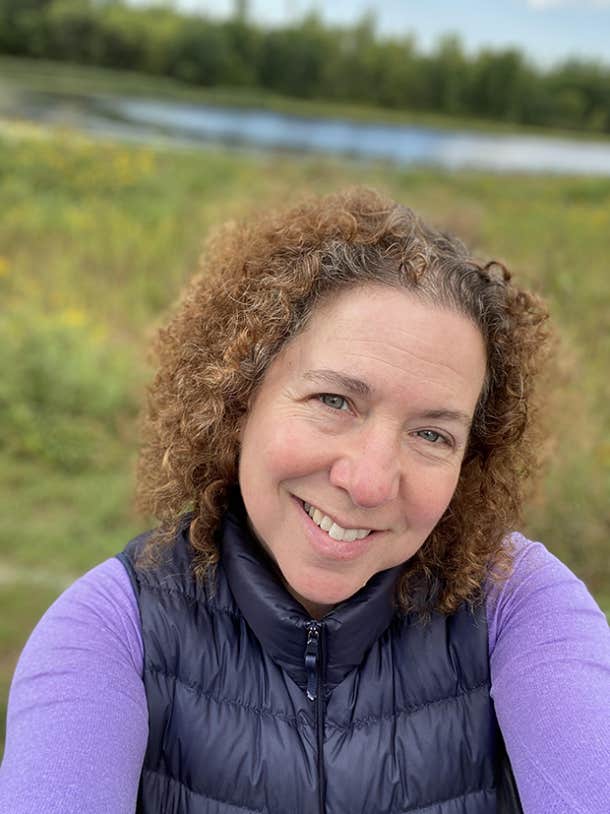I felt a kinship with those fish, fighting against the flow. A month divorced, alone on a mountaintop, I missed my three children, ages 2, 4, and 6, but needed to chart a new path for all of us. My marriage hadn’t been horrible, but I’d known six weeks before we married that he was not right for me. I just didn’t want to cancel the black-tie wedding and wait longer than age 28 to find someone to marry. RELATED: The 10 Seconds That Ended My 20-Year Marriage Now I had three children whom I loved more than anything. For the first week that I’d be away from them post-divorce, I ventured to the Pacific Northwest, a place I’d never been, to celebrate my 37th birthday and explore mountains and valleys and the city of Portland to see if I could find wisdom in the landscape and perhaps, a way forward. Birds winged among white oak and ponderosa pine. Wind feathered through chocolate lily, woodland star, and fairy slipper. I listened to the conversations of the trees, discovering the beauty of being alone. I entered a meadow ablaze in wildflowers, sank to the ground, and pulled just-picked strawberries from my pack. Far below me, the blue ribbon of the Columbia River snaked through the valley. I imagined salmon catapulting through it to spawn, water swelling around them as they surged against the current. Dog Mountain starts at a base of 150 feet and rises to nearly 3,000 over three miles of trails, its summit overlooking the Columbia River Gorge. Six miles total of meandering through heavy forest and meadows and a former fire lookout. I had never hiked that far in one go, and I was wholly unprepared for the severity of this hike. I’d never even wandered trails alone. It was not easy for a flatlander from the Midwest, but I believed I could do it, so I huffed with the ascent, the forest growing thicker and darker, roots snaking across my path. I passed no one on the way up. Deep in the woods without cell service, I tried not to think about rattlesnakes and scorpions, steep slopes, or slick paths, all the ways this blissful journey could go wrong. I wanted to find the waterfall through the tangle of trees and slip my feet into the cold water, but I could only hear its soothing rush somewhere far away.
Photo: Author My son Asher made his way into the world on a Friday afternoon in mid-March of my 30th year when Michigan roads were icy and the air held a bite of cold. He did not cry, just looked around while a nurse weighed him. I would love him in ways that I longed to be loved. My 1970s parents did their best to love me as fully and completely as any parents love their children and spent more time with us than their parents lavished on them. But I felt like a fish out of water, like I didn’t fit in my family. RELATED: 6 Things That Kill A Relationship Every Time (You’ve Been Warned) I withheld tears to avoid being called too sensitive. When I argued, I was called bossy and told I had a big mouth. I wanted to be appreciated for every inch of my rebellious self, to hear that my strident words and constant pushback showed strength and power and leadership and could be loved. But maybe that is too much to ask for any generation of parents; some are poised to handle the fragile flower of a feels-too-much kid, while others simply are not. I wanted my children to know they were wonderful exactly as they are. They slept beside me, nursed, and huddled in a sling while on the go. I believed these tiny souls needed to be close until they chose to separate, and I promised to pay attention and listen well. Eliana was born when Asher was 18 months old, and Shaya came two years after that. I cooked the meals, bought the clothes, did the laundry, and organized the house while supporting my family by writing freelance articles for newspapers and magazines. My husband was playing at being a freelance musician who did not perform on Fridays or Saturdays due to his Orthodox Jewish religious observance. He was a night owl while I rose before the sun. Most nights, he languished in our basement, in front of the computer or on the phone, while I went to bed alone. We fought incessantly — about his being late for dinner (where had he been?), where the money disappeared to (he never could explain it), why he went to therapy three times a week and paid with a credit card when he generated no income. When Asher got recurrent ear infections, I feared his body was trying to shut out all our yelling. A month after Shaya was born, my husband left for a week of unpaid gigs in Israel. I begged friends and family for advice. Should I leave? What would life be like as a single mother? Would I ever find love? Shaya lay across my lap as Eliana and Asher built forts out of blankets. When my husband called, the line crackled. His words cut in and out across the distance. I thought about our 350-person wedding in a hotel ballroom, my handmade dress of pearls, sequins, creamy satin, and sheer sleeves, and our awkward, fumbling wedding night. The continuous voice in my head: this doesn’t feel right, there must be something better, why did I settle? I wondered why he didn’t see how hard it was to be alone with three small children, why he didn’t choose to be by my side, why he didn’t want me. Shouldn’t we be in love with the family we created? Seven years in, shouldn’t our marriage have turned into a deep and growing kind of love? And then I remembered a moment at our wedding when we were hoisted on chairs during the hora. He reached a white napkin out to me, a symbolic gesture recalling more religious times when the bride and groom were not supposed to touch in public. He laughed and laughed, and I stared from my bouncing chair, gripping the arms so I wouldn’t fall, wondering what was so funny. Later, he told me that he’d used the napkin to wipe sweat from his face before handing it to me. A symbolic gesture. A schoolyard joke. We were misaligned from the start. An older friend said, “It’s ok if you wait a year. You have a newborn and two toddlers. Give yourself time.”
Photo: Author When Shaya was a year old, as a last attempt to save my marriage, I left Asher and Eliana with my parents and went to Aspen for a writers conference with my husband and baby. As a freelancer working around the kids’ naps and carpools, I wanted to expand editor relationships and perfect my craft. When I wasn’t in workshops or at lectures, we hiked into the belly of Maroon Bells, Shaya on my husband’s back, the silence of the mountains whispering around us. RELATED: If These 4 Behaviors Are Present In Your Relationship, It’s Doomed I tried to find something to talk about, but nothing came except the woosh of the wind. I stared into the distance as if the landscape held secrets. At night, all I wanted was to lie in bed with my baby and dream of the evergreens, the tiny dust clouds kicked up by my feet on the path, and the view of clouds kissing mountaintops. Back home, later that summer, my aunt and I traipsed along a hilly, gravel road called Scenic Drive. In my sensitive, yearning childhood, my aunt had been my salvation. I’d call her for advice, support, and reassurance that I was lovable. My mother’s youngest sister, Auntie Suz is 16 years older than me. When I was born, she drove around yelling out the open car windows, “I have a niece!” She was a hippie with long brown hair and bell-bottom jeans; at her wedding, I wore a yellow, ruffly flower girl dress and burst into tears under the chuppah because my new uncle was taking her away from me. When I turned 10, they took me on a camping weekend to celebrate my double-digits birthday. On the hike, I told her about my husband’s five-figure therapy debt and his meager earnings from sporadic gigs. Squirrels scampered under trees. Thick bogs hid in dense woods. Birds and deer flitted in the shadows. “He needs to find a therapist who takes insurance or go less frequently to this one,” she said. “He needs to put the family first.” When I reiterated her words, my husband shook his head. Therapy would cure his depression and help him succeed as a musician, he insisted. “I’m not going less, and I’m not finding another therapist.” “Well, can you get a job to pay for therapy?” “I can try,” he said. I looked at his blond goatee sprinkled with gray, his bald head which had been a downy crown when I first married him, and the underbite his mother apologized for never correcting with braces. It’s funny how a person can be attractive when you want them and not attractive whatsoever when they fall out of favor. I thought about how depressed he’d been when we met. He wore shorts with untucked T-shirts and unbuttoned flannels. I knew we were not a perfect match but pledged to go through with the black-tie wedding because I believed I could help him become a better version of himself. I also didn’t believe I’d find someone better. Over the years, I’d gained confidence, which led me to feel I’d rather be alone than with the wrong man. The light from a white sun bore through the window. My breath was even, my heartbeat calm as sleep. Being alone would be simpler, at least, and strengthening at best. That day, I renamed Scenic Drive the Freedom Trail. He cried when I said I was leaving. “Will we be friends with benefits?” he asked as we divvied up the dishes. I thought of the awkward nights when I wanted him to know my body but arched in discomfort when he touched me. For years, I’d dreamed of my college boyfriend and our easy passion, waking lonely beside my husband. “You’ve got to be joking,” I said.
Photo: Author When I hike, I wonder who chooses to map the mountain, make paths in the wild, and determine where people should walk that won’t hurt the forest. Someone tames the wilderness, to invite in those who want to learn its secrets. It feels brave, and daring, to do such work. In Michigan, there are woods with winding paths and some inclines, but they’re hills, not mountains. I needed a steep trail to feel the burn in my thighs and the heartbeat in my ears. For so long, I’d relied on others for guidance. No one suggested listening to my own voice or making decisions on gut instinct. RELATED: 7 Signs You Have Unhealthy Boundaries (That Will End Even The Best Relationships) When I was a new mother, I scoured books for wisdom, but all the conflicting advice convinced me that only I could know what was best for my babies. I breastfed, co-slept, made chicken soup with sweet potato, zucchini, and carrot, let them jump in puddles after a spring rain, and whispered stories as they drifted to sleep. I created my parenting map, my instincts leading the way. Now I needed a map for myself.
Photo: Author I came to Dog Mountain on the recommendation of the hotel reception staff. Hipsters with piercings and man buns, they’d asked whether I wanted an easy hike or a difficult one. I told them I was from the Midwest, but up for a challenge. They said to pack plenty of water. The hike is not just about exercise or pretty views. It’s a test of wills, an endurance feat, a challenge to see if I can be on this mottled dirt, at this moment, as the wind whips my hair around my face. It’s an experiment to see if I can quiet my clanging mind, forget about all the moments I climbed over to find this spot, and banish my fears about what lies ahead. The descent is always faster than the climb, and easier. On Dog Mountain, there were more signs on the way down, and lots of people. We exchanged smiles, strangers on a shared mission. The hike consumed the whole of the day, and I returned exhausted but exhilarated, my curls plastered to my face, dirt in the creases of my eyes. I approached the reception desk as they were finishing their shift. One of the guys looked at me and chuckled. “Not sure I would have gone if you had told me how hard it was,” I said. “That’s why we didn’t tell you,” he said. After my divorce, a grueling hike became the easiest thing I could do. On the trail, there is nowhere to go but straight ahead. When I reached the top and started to head back down, I was reassured by the crisp air and waving branches. My body throbbed with the intensity of the forest, and the excitement of my unclear future. Lynne Meredith Golodner is a public relations pro, entrepreneur, and author of eight books, including ‘The Flavors of Faith: Holy Breads’ and ‘In The Shadow Of the Tree: A Therapeutic Writing Guide For Children With Cancer’. Follow her on Twitter.



